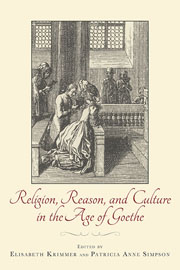Book contents
- Frontmatter
- Contents
- Acknowledgments
- Introduction
- I Wieland and Herder
- 1 “Über Glaubenssachen filosofieren”: Wieland on Reason and Religion
- 2 Personal Impersonalism in Herder's Conception of the Afterlife
- II Schiller and Goethe
- III Kleist and Hölderlin
- IV Leibniz, Spinoza, and Their Legacy
- Notes on the Contributors
- Index
1 - “Über Glaubenssachen filosofieren”: Wieland on Reason and Religion
from I - Wieland and Herder
Published online by Cambridge University Press: 05 December 2013
- Frontmatter
- Contents
- Acknowledgments
- Introduction
- I Wieland and Herder
- 1 “Über Glaubenssachen filosofieren”: Wieland on Reason and Religion
- 2 Personal Impersonalism in Herder's Conception of the Afterlife
- II Schiller and Goethe
- III Kleist and Hölderlin
- IV Leibniz, Spinoza, and Their Legacy
- Notes on the Contributors
- Index
Summary
Throughout his long and productive career as a publicist, novelist, essayist, philosopher, and educator, Christoph Martin Wieland grappled with the meaning of religion for individuals and human societies. Wieland's work is of particular interest to the study of religion and secularization in German Classicism because he demonstrates how secular interests can shape serious intellectual engagement with religious concerns. Wieland's approach to religious questions is multivalent, but it is decidedly this-worldly rather than theological. Wieland's writings on religion are distinguished by his rationalist critique, his political and social pragmatism, and his anthropological focus on how religious experience provides insight into human nature. These three approaches to questions of religion each serve the Enlightenment project, of which Wieland is a representative figure, and which is often equated with modernity and secularization in the West. Yet Wieland presents a distinctive voice in late eighteenth-century deliberations on the role of religion in human experience and its relationship to reason. This voice is defined by his self-conscious method of inquiry, his interest in the relation between the secular and the religious, and by his attention to authorial tone. Both method and tone reflect important anthropological and philosophical convictions he holds about human nature and the limits and possibilities of human knowledge.
- Type
- Chapter
- Information
- Religion, Reason, and Culture in the Age of Goethe , pp. 21 - 55Publisher: Boydell & BrewerPrint publication year: 2013



